
On the benefits of working slowly
thecreativeindependent.com – Thursday November 7, 2024

Caoilinn Hughes discusses writing as a process of discovery, being a monotasker, and the importance of wisdom in producing good work.
You’ve had a very international life. You grew up in Ireland, where you studied literature and drama. You subsequently lived in New Zealand, where you earned a PhD in English literature, and in the Netherlands, among other countries. Could you describe your path to becoming a writer?
I was always writing, even when I was a kid, aged nine, ten. As a teenager, I wrote a lot of poems, as that’s really what I read. I read poetry and plays, because I was a very slow reader. It felt like a very intimate interaction. There’s all this blank space around the work, and it seemed to invite a direct conversation between the author and the reader. An activity, rather than something that you receive passively.
I went to the North of Ireland to study at Queen’s University Belfast, partly because I didn’t have the grades to go to college in the Republic. And also, a lot of the poets I was reading were from the North, so it felt fated to go there.
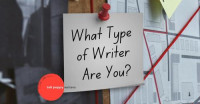
Pantser vs. Plotter: Authors Debate the Best Approach to Writing
booktrib.com – Saturday November 2, 2024

In another life, I’m a writer who meticulously plans out the entire trajectory of my book before I even touch my fingers to the keyboard. When I sit down to work, I refer to the chapter outline I created, which maps out every beat of the story.
So straightforward! So elegant!
Unfortunately, that’s not my approach. My muse-dependent technique is what’s known as “pantsing,” or flying by the seat of my pants, and if I could change it I one-hundred percent would. Sometimes, the end of the chapter means the beginning of a crisis while I struggle to figure out what’s supposed to happen next?
The other side of the writing equation, being a “plotter,” is tougher during the initial drafting stages since it requires the writer to conceptualize every twist and turn before starting, but it ensures a more predictable writing process as the narrative unfolds, and easier editing.
I’ve tried outlining, but my biggest issue with it is I feel disconnected from the story if I don’t let it unfold naturally. I’ve found that outlining limits the serendipity I crave when I’m immersing myself in the writing process. I love it when my characters surprise me, which happened quite a bit as I worked on my last novel, Unleashed Holiday.
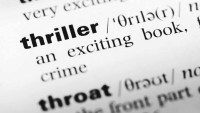
The Heartbeat of Suspense: Mastering Pacing in Thriller Writing
rollingstone.com – Friday November 1, 2024

In the pulsating world of thriller fiction, pacing is the silent conductor, orchestrating a symphony of tension and release that keeps readers perched on the edge of their seats. It’s the art of manipulating the reader’s pulse, accelerating it with bursts of action, then allowing brief moments of respite before plunging back into the maelstrom. This delicate balance is what transforms a good thriller into an unputdownable page-turner.
The Anatomy of a Thriller’s Pace
At its core, effective pacing in thrillers is about managing the ebb and flow of tension. It’s akin to composing a piece of music, where crescendos of intensity are balanced with quieter passages, each enhancing the impact of the other. This rhythmic variation is crucial in maintaining reader interest and engagement throughout the narrative.
Hooking Readers from the Start
Many successful thrillers begin in medias res — in the middle of the action. This technique immediately immerses readers in a high-stakes situation, grabbing their attention and setting the tone for the rest of the novel. The opening pages serve as a promise to the reader, a taste of the thrilling journey that lies ahead.

Inside the writers’ room
artshub.com.au – Friday November 1, 2024

Getting a toe in the door of the writers' room can be challenging, but these successful writers share some tips.
A writers’ room is something like the nerve centre of a scripted drama or comedy, a place where some combination of writers, producers, editors and developers come together to brainstorm the overall arc of a series and flesh out the plot of each episode.
Many playwrights, comedians and filmmakers aspire to break into the world of writers’ room, but they present challenges in adapting to someone else’s voice and working in a newly collaborative way. They can also be mysterious to the uninitiated and are notoriously tricky to break into.
Here ArtsHub talks to four writers who have worked in a range of rooms, and who have taken different paths to these writing gigs, to discover how they found their way in and what they’ve learned.
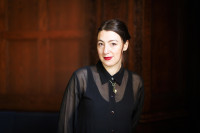
‘Dark things can be quite illuminating’
news.harvard.edu – Friday November 1, 2024

Horror writing instructor defends prestige of ‘genre that bites back’
Self-described “former spooky kid” Katie Kohn teaches the class “Advanced Fiction: Writing Horror” at Harvard Extension School. The Gazette interviewed Kohn, a doctoral candidate in the Art, Film and Visual Studies program, about people’s fascination with scary stories, the difference between bad and good horror, and what the genre can teach us about ourselves.
What makes horror stories different from other stories?
All stories are rooted in conflict; they promise us that things will go wrong. But horror stories do two things that I truly think are unique. For one, horror tends to destabilize the very binaries out of which other stories source their tension. It’s not just about playing good against evil, the familiar against the strange. Horror complicates. For instance, we use the term “uncanny” to describe a breakdown between something we recognize and something we don’t. It’s neither simply familiar nor strange; it’s somehow both. Horror loves to take us to these places where nothing is certain, where it feels like the rug is always about to come out from under us.
That’s the other effect horror stories promise: uncertainty to the very end. Horror asks us to accept the prospect that things might not turn out well. If other stories overcome challenges or resolve tensions, this one might be as raw and as confrontational as life can be, without curation or niceties. For instance, there are points at which we no longer feel safe reading a horror story or watching a horror film, that moment when we want to look over our shoulder or check under the bed. All stories ask that we suspend our disbelief. Horror exploits that basic instinct to give ourselves over to stories. Horror is a genre that bites back.

Who’s Really Writing Celebrity Novels?
vulture.com – Friday November 1, 2024

The writers and agents working behind the scenes tell us how it actually works.
Celebrity memoirs are a dime a dozen, but there’s a smaller cohort of stars who have tried to add “novelist” to their résumés. This includes Kylie and Kendall Jenner, who wrote the 2014 YA novel Rebels: City of Indra; Carrie Fisher, author of the deeply autobiographical Postcards From the Edge; and Tyra Banks, whose 569-page Modelland is about a girl named Tookie De La Crème. In early October, Reese Witherspoon announced she was collaborating with the best-selling thriller author Harlan Coben. But what does it mean when a celebrity decides to write fiction?
Here, the writers and agents working behind the scenes on similar books tell us how it actually works.
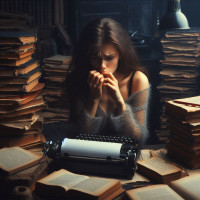
Suspense (A state or condition of mental uncertainty or excitement…)
By G. Miki Hayden
Instructor at Writer's Digest University online and private writing coach
firstwriter.com – Thursday October 31, 2024

Suspense, as a noun, may sound vague, but as an artful expression in film, on stage, or in novels, suspense is a fairly specific ingredient. Suspense can dominate the genre being presented throughout, or suspense can come to the fore for a scene or a moment at the height of the story, and then resolve. Suspense can be sprinkled in like a condiment, or it can relentlessly keep an audience on the edge of their seats for the entire piece.
No matter how suspense is used, in a mystery, ghost or horror story, in an adventure, or as part of a futuristic end-of-the-world drama, this chilling emotion will pay off its creator well, in dollars and in fame. However, real suspense can be hard to produce.
On stage or in film, suspense can be urged along by music, spooky shadows on the set, or an actor’s makeup; yet on the page, suspense can only be produced by… words. But ,as we writers all must know, the word is mightier than any other means of affecting human emotion. And thus words will certainly do.
So, how do we keep the reader in a state of mental uncertainty or excitement? By sleight of hand, of course, by suggestion, by both the usual means and the unusual.

Agony Editor: How to tell a fellow writer it’s time to move on
quillandquire.com – Wednesday October 30, 2024

Dear Agony Editor,
A guy in my writing group has been working on a short story for three years. Every time it’s his turn to submit work for the group to critique, it’s the same story with only minor adjustments. I’ve said everything I have to say, and truthfully, the story isn’t working. If I have to read it one more time, I’ll scream. I want to tell him to move on, but how do I do it delicately?
Signed,
Rinse and Repeat

Seven of the best UK retreats for aspiring writers
thetimes.com – Tuesday October 29, 2024

These weekends away will get your creative juices flowing with journaling workshops, special guests and, of course, desks with stirring views
Some say everyone has a novel in them — and the recent boom in self-published books suggests it could be true. According to the website Wordsrated, 300 million self-published books are sold each year, while the newsletter platform Substack has reported a 50 per cent growth in new writers over the past 12 months. But whether you’re writing for yourself or you have a three-book publishing deal, the hardest part of the process is often getting started. We’ve found seven retreats to help you to put pen to paper, each somewhere lovely.
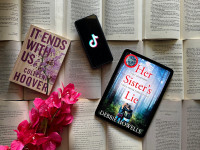
When bestsellers fail to deliver: Don’t fall for the promises of book tok reviews
tribune.com.pk – Saturday October 26, 2024

Every few weeks, I head on over to our local library and come back home with as many books as my backpack can carry. Where others dream of holidaying in the Bahamas (or Switzerland or Dubai or what have you), my dreams are just as ambitious: I yearn to sink into the sofa with a Really Good Book.
You would think, with all the untold promises of book tok and the liberal abundance of five-star reviews on Goodreads, that successfully nagging a Really Good Book would be as easy as buying bread. Please bury this foolish pipe dream immediately. If my library haunts have taught me anything, it is that it is easier to book and pay for that Bahamas holiday, or even a weekend away on Mars, than it is to find a good book in the league of, say, John Grisham of the late nineties. Or JK Rowling during the Harry Potter days. Or even the Hardy Boys. Or, if we are open to facing dead and buried memories, Sweet Valley High.
Which neatly segues us into our burning issue of the day: the mediocrity of modern books. Why, pray, is the psychological thriller and Sunday Times bestseller that promised me a “haunting” and “dazzling” read less interesting than the back of a cereal box? In order to answer this grave and burning question, I invite you all to dissect Exhibit A, aforementioned haunting and dazzling thriller Her Sister's Lie by Debbie Howells. I was forced to endure this book after an ill-fated library expedition comprising five other uninspiring reads, and I see no good reason you, too, should not suffer.
Get the free newsletter | Submit a news item or article | Get Writers' News for your website





